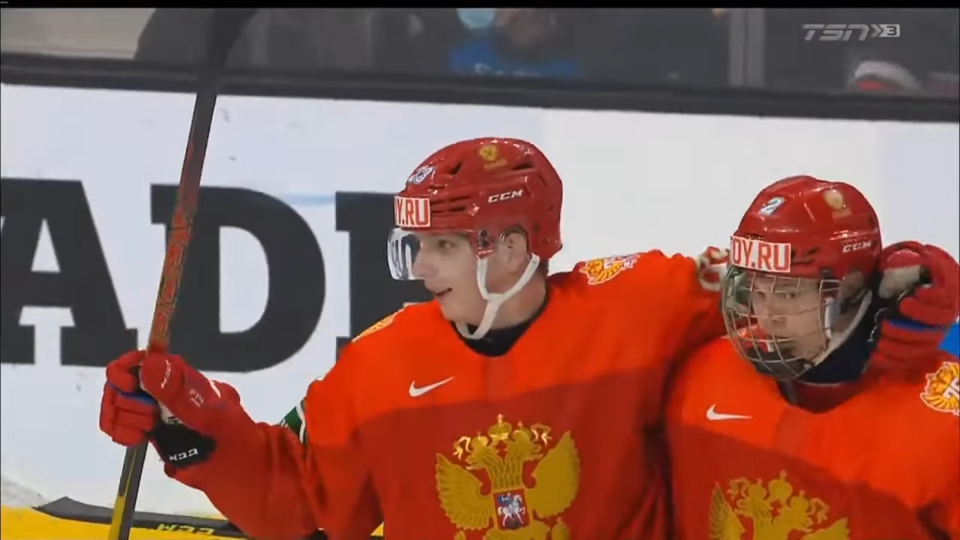Dmitri Zlodeyev’s World Junior debut on Sunday did not go as planned. In Russia’s 6-3 loss to Sweden, Zlodeyev was on the ice for two of Sweden’s goals and in the penalty box for one more.
On Monday against Switzerland, in his second game of the 2022 World Junior tournament, Zlodeyev had a much better game, to the point that he was named Russia’s best player.
Zlodeyev is the lone Canucks prospect at the annual World Junior Championship, and he was drafted in the sixth round of the 2020 draft. The 19-year-old forward is playing on Russia’s fourth line and was bumped from centre to the left wing after the first period of Russia’s game against Sweden. He stayed on the left wing against Switzerland, playing primarily with Ivan Zinchenko and Ivan Didkovsky, neither of whom have been drafted by an NHL team.
In the 4-2 win over Switzerland, Zlodeyev had just 9:47 in ice time but he made the most of his limited minutes and was heavily involved all game.
After Danila Yurov opened the scoring with a lucky, pinballing goal, Zlodeyev scored Russia’s second goal of the game to make it 2-0.
It was an impressive individual effort from Zlodeyev. He picked up a loose puck in the neutral zone and tried to create some space with a head fake on Swiss defenceman Arno Nussbaumer, who wasn’t biting. Unable to get around Nussbaumer to the net, Zlodeyev tried to catch goaltender Kevin Pasche off his post but hit the outside of the post instead.
Zlodeyev stuck with the puck and outbattled Nussbaumer to get the puck out front, then caught Pasche off-guard with a wicked release on his shot.
It wasn’t the prettiest goal but it displayed two of Zlodeyev’s best attributes: his effort level and his heavy shot, which he doesn’t use anywhere near enough.
That heavy shot came into play again late in the second period. His wristshot was blocked by Nussbaumer off the inside of his knee, and it sent the Swiss defenceman crashing to the ice in pain. Nussbaumer had to be helped to the bench and didn’t return to the game.
Zlodeyev also nearly had a second goal in the second period on a fast-developing 3-on-1. Zinchenko tried to sell the shot from the middle of the ice then set up Zlodeyev, but Pasche read the play perfectly and robbed Zlodeyev with his blocker, arguably his best save of the game.
Zlodeyev had another chance on a breakaway up the middle but he was hooked from behind and taken down with no penalty call.
Most players don’t get that many great scoring chances in 18 minutes of ice time: Zlodeyev got those three chances in less than ten minutes of ice time. Teams typically like to spread “best player” awards around during the World Juniors, but Zlodeyev fully earned the accolade in this game.
Aside from his scoring chances and goal, Zlodeyev showed some other nice attributes. Against both Switzerland and Sweden, he played very well along the boards, winning puck battles and protecting the puck to prolong offensive zone possessions. He made simple but smart passes to relieve pressure.
On the forecheck, Zlodeyev took smart paths to the puck, forcing Swiss defencemen to make less-than-ideal breakout passes.
He’s one of the few Russian forwards to regularly make a beeline to the front of the net off the puck and plant himself there, battling with defencemen to create traffic in front. Much of the Russian offence has come from the perimeter, so Zlodeyev’s willingness to get to the net is noticeable.
There are some flaws that have been evident, however. His skating needs a lot of work, especially when he has the puck. He has a wide stance and often stops skating when he’s stickhandling. At times, he accelerates well, particularly in straight-ahead situations, but his lateral mobility is lacking and he struggles to create separation.
That’s an issue, because if he isn’t creating separation against his peers at this level, he’ll likely end up a step behind at the NHL level.
Sometimes, poor skating is fixable but it can often take a lot of time and effort. Zlodeyev has the motor to make up for his skating at lower levels but he has work to do if he wants to join his countryman Vasily Podkolzin on the Canucks.
One of the areas where Zlodeyev’s poor skating shows up the most is when he’s carrying the puck. He adopts a wide stance and stops skating when he’s stickhandling, which is also something that showed up in Podkolzin’s game before he came to the NHL. Podkolzin has worked on that area of his skating and is a lot more dynamic now with the puck but that’s something that Zlodeyev needs to address.



.JPG;w=120;h=80;mode=crop)